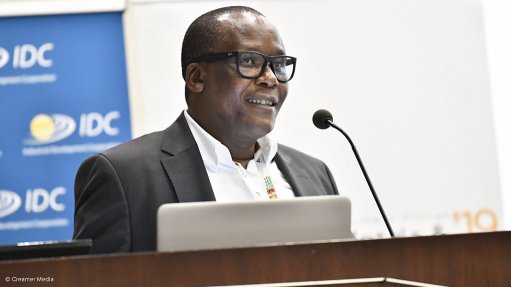
Seifsa president Elias Monage
Photo by: Creamer Media's Dylan Slater
Steel and Engineering Industries Federation of Southern Africa (Seifsa) president and board chairperson Elias Monage on Friday reiterated the challenges facing South Africa's metals and engineering sector, as well as the broader economy.
In a copy of an address delivered by Monage during a Seifsa meeting, he pointed to lower metals and engineering sector output, which was, in part, driven by lower aggregate demand.
He indicated that the state of the sector was a reflection of the performance of economic activity in South Africa.
“The role played by our metals and engineering sector towards economic growth is still fairly negligible when compared to the pre-economic and production crises years of 2009 and 2014 respectively.
“The sector’s lacklustre economic productivity reflects the very disappointing growth in domestic demand since 2007, during which growth in gross domestic product (GDP) has been hovering at about 1% a year,” he said.
While he noted that there had been some improvements achieved on many fronts under the leadership of the new Presidency, Monage stressed that a number of challenges remained.
“There continued to be a multiplicity of contradictory – and often influential – voices heard on the economy, sometimes from within the ranks of the governing party, at a time when consensus is desperately needed to engender investor confidence.
“While welcome efforts were made to reach out to business and labour, more remains to be done to forge a stronger partnership among government, business and labour,” he posited.
Monage noted that the sector’s continued survival depended on the local sectors and industries, including mining, construction, petrochemicals and automotive, that bought the products it produces.
Moreover, he said there was a need to continually grow market share in regional markets and also mitigate exposure to potential risks from the existing trade war between two of the world’s largest economies – China and the US.
“Competition is encouraged, albeit in a business-as-usual atmosphere rather than belligerently.”
Meanwhile, Monage said efforts to extend the 2017 to 2020 Metals and Engineering Industries Bargaining Council (MEIBC) main agreement to nonparties had not been concluded during the year under review.
The MEIBC continued to function under administration under the control of a Court-appointed administrator.
To date, the administrator has appointed a council secretary with strong accountancy and corporate governance skills and tabled a rehabilitation plan. He has been effective in reducing overheads, while stabilising the council’s finances, Monage noted.
He indicated that while administration had been effective in preventing the complete collapse of the bargaining council, important work remained, particularly in the area of extending the coverage and scope of the council’s levy agreements, which he stressed was important to the long-term survival of the institution.
Monage emphasised that the metals and engineering cluster of industries needed greater support from both the government and captains of industry to trigger a turnaround.
Further, the slow pace of transformation in the metals and engineering sector continued to be of concern.
“As a sector, we need to stand up and embrace change and advocate transformation. Not only is it in South Africa’s interest for that to happen, but it is also fundamentally in business’s own long-term interest.
“It is of critical importance that a concerted effort is made by the sector to create meaningful opportunities for all South Africans to play a crucial role in taking our industry to new heights.”